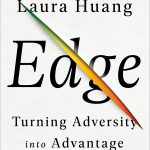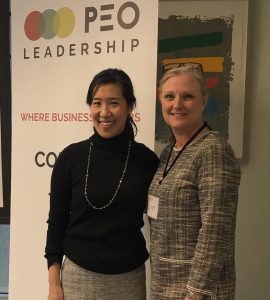Recently a Harvard Business professor said something that I had. been thinking for years (yes, it’s great when a Harvard Business School professor validates your thinking!). It was during a presentation in Toronto by Dr. Laura Huang that I heard a powerful message that made me feel as though I was on the right track with something I had been saying for a long time.
Laura was there to talk about her new book, Edge; Turning Adversity into Advantage. She wove statistics, research, and stories together in a way that had me on the edge of my seat. We had her for an hour but I could have listed to this amazing woman all day.
So, before I tell you what she said that made me feel as though I knew what I was talking about, let me tell you about her book.
 From the jacket flap:
From the jacket flap:
‘In an ideal world, we’d succeed based on our actual skills and performance. But in the real world, subtle perceptions and stereotypes – about appearance, race, gender, experience, and more – color others’ perceptions… Success is about knowing who you are and using that knowledge strategically and unapologetically… Edge will help you make your hard work work harder for you. It will help you be seen – and empower you to take the spotlight with authenticity, charm and poise.’
During her talk, Laura shared a strategy that women (and others) can use to address how we answer questions that are asked of us during a job interview. This strategy could also be used in a multitude of other scenarios, but it goes like this: when you understand the underlying perceptions, address them subtly to flip it in your favour. So, if someone asks you a question about a time when you faced a difficult situation that didn’t turn out the way you wanted it to (prevention question), answer the question, and then flip the story to one of how it taught you something, made you stronger, or impacted how to approached another situation (promotion answer). In other words, take control of the narrative that turns a perceived weakness into a strength.
“Success is about knowing who you are and using that knowledge strategically and unapologetically”
Now, key to this is to be subtle about it. Not being the queen of subtlety, I was particularly interested in how to do this better so I listened intently. As she gave us some examples, my mind went to my own hypothetical scenario of a beautiful blonde woman in a meeting with men and being perceived as dumb and incapable. I understood her point to mean that one should not say something like, “I know you think I’m a dumb blonde and don’t belong in this conversation,” but rather to strengthen your vocabulary and learn to articulate ideas in a clear and concise way, so people only need to listen to you for a short time to realize that you are anything but dumb.
 Because I wanted her perspective on other ways women could help themselves in these situations, I spoke to Laura after the meeting. I had a delightful chat with her, and she pointed me to the chapter in her book where I could find more answers.
Because I wanted her perspective on other ways women could help themselves in these situations, I spoke to Laura after the meeting. I had a delightful chat with her, and she pointed me to the chapter in her book where I could find more answers.
I found stories of people like Dawn (love the name) Fitzpatrick, a trader at the American Stock Exchange who used humility (women tend to be better than men) as a way of guiding her investment decisions. Then there was the story of Laura herself having a conversation with someone in his office where memorabilia from his favourite sports team was displayed. Laura subtly brought in references during the meeting to the sports team, of which she was also a fan. My favourite was the one where Laura shared her distaste for networking over drinks and how a serendipitous meeting at an airport led to a taxi ride that was the foundation for a long-time meaningful connection. And, you’ve got to buy the book to read the “Prom Queen” story that starts on page 196 and doesn’t really end until she describes herself as a “diamond in the rough” on page 201.
I believe a key message here is that as women, we need to learn to tell a different story. I used to be embarrassed about the fact that I’m a high school dropout. Whenever I tell the story, I’m sure to quickly follow that opening statement with the fact that I was a great student and I left for monetary reasons (another blog for another day) and not for the other reasons people assume a 16-year-old girl has to quit school.
Here’s the interesting thing… as I listened to Laura speak, and as I read her book the next day, I realized that I was already doing exactly what she was suggesting. My story of dropping out of school is one of perseverance and determination and commitment and learning from mistakes along the way and picking myself up after I had fallen. I even try to inject a bit of humour into my story saying it’s a bit of a family joke in that I’m the most, and least, education person in my family because I’m a high school dropout with a Masters degree.
“We are all diamonds that sparkle in different ways.”
In my speeches, I often bring up two points together to illustrate that women have to work twice as hard as men to receive the same rewards. One is the point about a study done in Switzerland that actually showed women have to work 2.5 times harder to earn the same recognition, and the second is the quip that Ginger Rogers had to do everything Fred Astaire did, only backwards and in high heels. Laura’s point is to turn that story into something that works as an advantage for you in telling your own story. What were you able to accomplish as you did all that hard work, what did you learn along the way, and how did it shape your thinking and your character? It’s a totally different way to think about something that you may perceive as an egregious injustice.
“Let your past make you better, not bitter.”
I love how she closes off Part 3 of the book: “Your past is not something that you should lament; it should be another asset in how you gain your unique advantage. Let your past make you better, not bitter.”
So, what was it that Dr. Laura Huang, Harvard Business School professor said that made me feel so good about what I have been saying all along?
She said that while biases and stereotypes are a reality, they are simply a cognitive process that allows our brain to process large amounts of information. They aren’t going away and we have the ability to flip them to our advantage.
You see, I believe that gender diversity is really a 3-pronged problem. The women have essentially fixed themselves and now it’s time for the companies to do their part (read more about that in my book The Ruby Report, How Organizations Can Profit by Promoting Women Leaders). Women must not lose sight of the fact that the playing field still isn’t level. It’s not fair, it’s just fact.
So, while we don’t need to “fix” ourselves, we do need to be aware of the stereotypes and biases that are being applied to us and navigate them. Dr. Huang’s strategy on how to do that is simply brilliant.